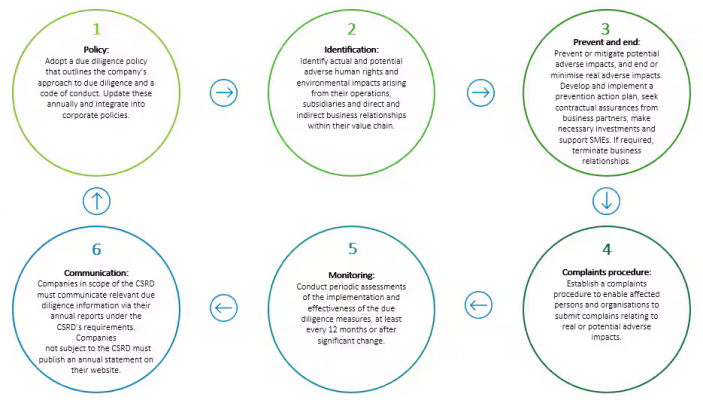From 2029, companies in Europe will have to demonstrate environmental and human rights protection throughout their supply chains, including with their supply partners.
In March, a new law on supply chain due diligence – the Corporate Sustainability Due Diligence Directive (CSDDD) – received the support of a majority of European governments. It is expected to be voted on by the full European Parliament after that body's Legal Affairs Committee approves the revised version.
The directive is part of the EU Green Deal and sits alongside other new regulations such as the EU Corporate Sustainability Reporting Directive (CSRD), which focuses on sustainability reports. With this regulation, businesses that want to operate in the EU market must meet a number of additional strict regulations on the environment and human rights.
Since the EU promoted the Green Deal, a series of sectors of the more than $19 trillion economy have been reviewed to meet the bloc's emissions reduction goals. This strategy is consistent with the development trend of emerging fields such as technology, digitalization, and renewable energy. But at the same time, traditional manufacturing industries face more pressure to meet new environmental criteria.
What is CSDDD?
The directive will require large companies to assess their supply chains to identify issues such as forced labor and environmental damage. Due diligence will be important as companies will need to demonstrate that they are complying with human rights and environmental protection across their supply chains, including their own and those of their suppliers. Companies will also have to demonstrate the corrective action they are taking to resolve any issues that arise.
Accordingly, companies will be required to develop preventive action plans and persuade their direct business partners to agree to comply with such plans. Once these agreements are in place, European businesses will also have to check that their suppliers meet the requirements.
Which companies are affected?
According to Reuters, the majority approved this directive after tense discussions surrounding concerns that this law would be a large "bureaucratic burden" for businesses and put European companies in trouble. advantage in international competition.
Another hurdle is defining what makes a great company. Initially, the European Commission defined the threshold for a large company as having a worldwide net turnover of 150 million euros and 500 employees, but this has been revised to a worldwide net turnover of more than 450 million euros ($416 million) and 1.000 employees.
Reuters said the bill, if passed, would be implemented over a year, starting with companies with 1,5 billion euros ($1,4 billion) in revenue and more than 5.000 employees. Over time, the law will also apply to non-EU businesses with significant turnover within the bloc.
While the initiative has been welcomed by human rights and environmental groups, some have pointed out that the latest bill excludes more than two-thirds of European companies. They worry that this erosion could make the law less effective.
However, the CSDDD will not only finalize EU Green Deal legislation but also align its legislation with international standards of due diligence related to human rights. These include the United Nations Guiding Principles on Business and Human Rights, the OECD Guidelines for Multinational Enterprises and the OECD Due Diligence Guidelines on Responsible Business Conduct.

Instructions for implementing new regulations that EU businesses need to pay attention to (Source: Deloitte)
Implementation is a must
Experts say that for companies that will be covered by the CSDDD, identifying compliance and implementation strategies now is very important. Under the proposed law, each EU member state would appoint a supervisory authority to check company compliance. Member states will also cooperate through the Network of European Supervisory Authorities. These agencies can conduct investigations and impose non-compliance penalties – including fines of up to 5% of a company's worldwide net revenue.
In practice, companies will need to clearly outline due diligence policies and conduct risk assessments to prioritize the most important environmental and human rights risks in their supply chains. These risks must then be addressed through a variety of measures, including integrating codes of conduct into supplier contracts, as well as establishing grievance mechanisms. They will also have to provide redress in cases where they have contributed to the impact.
The extent of companies' obligations, which has been the subject of fierce debate in recent weeks, will be clarified in the final draft.
Experts note that CSDDD does not specifically require supply chain traceability, but companies will need to be prepared with a comprehensive understanding of their suppliers' operations. They must also establish pathways for tracking and procurement across the supply chain, establish due diligence policies (if they don't already exist), and train procurement and product teams, among other actions.
Sources: Business Forum Magazine



